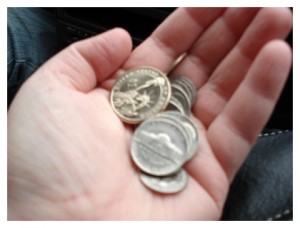The aircraft carrier Midway is docked in San Diego harbor about one mile from where I’m staying. I passed it during my morning run. Across the harbor I saw three other aircraft carriers and assorted navy vessels docked in port. Large, cold, gray, steel structures. All awaiting sea duty.
And as I passed by on a hot morning in Southern California a handful of stray thoughts came together.
- I thought of my father who spent a third of his life in the Navy and a good part of that at sea.
- I remembered my children calling me last Sunday to wish me a Happy Father’s Day. How great that was. How proud I was of them. And how unfortunate that there was no one for me to call.
- I thought of the news of Tim Russert’s passing and the interviews his son gave over the weekend. I thought of Russert’s book about his father and my repeated threats (any meager attempts) to write a similar book about my dad, Jerald E. Johnson.
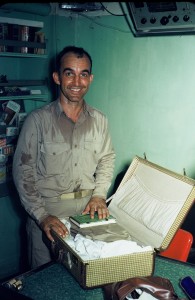 So here’s a belated tribute to my father for Father’s Day. You can see him here. It is my favorite picture. He’d been at sea for I don’t know how long. A long time. I think 9 months was standard back then. He just got news that he was going home. Going home to see his cherished wife and growing family. He asked his buddy to take a picture. It was over a hundred degrees below deck somewhere in the mid-Pacific. But captured in that singular moment is a man so happy, so joyous, so excited, that no amount of physical pain or discomfort mattered. He was going home.
So here’s a belated tribute to my father for Father’s Day. You can see him here. It is my favorite picture. He’d been at sea for I don’t know how long. A long time. I think 9 months was standard back then. He just got news that he was going home. Going home to see his cherished wife and growing family. He asked his buddy to take a picture. It was over a hundred degrees below deck somewhere in the mid-Pacific. But captured in that singular moment is a man so happy, so joyous, so excited, that no amount of physical pain or discomfort mattered. He was going home.
By any modern-day objective standard, my father was not a great man. He didn’t amass large amounts of money. He didn’t end up in history books. He won’t be known for holding records or achieving breakthroughs. There were no television cameras at his funeral. He was wise but didn’t claim any towering intellect or superior skill. He had no 15 minutes of fame.
But by human standards — by personal standards — he was an impressive and influential figure. He was a man of superior integrity and character. He believed in the value of honesty, decency and hard work. He was a man completely in love and dedicated to his wife, Joyce (he confided in me often that he loved Mom so intensely he couldn’t imagine life without her). He was a Christian who combined an intense faith with even more intense love and compassion. He was kind, loving and generous. But he also believed in asking tough questions and challenging foolishness. He made people think. Finally, he was humble and genuinely more interested in others than himself. (That alone would disqualify him from modern day concept of “greatness.”)
I say with full confidence and strength of character that I — and most others — would do well if we only were to come close to the standards of character, commitment, and compassion that Jerald E Johnson set for me and my family.
What does any of this have to do with ideas, issues, and brands?
Perhaps this.
Perhaps we should think twice about our obsession with youth. Perhaps we should reconsider and reignite a respect for ancestors. Perhaps we should second guess our mistaking celebrities for heroes.
Perhaps we should put more value in character than we do in accomplishment.
So thanks, Dad.
Happy (belated) Father’s Day.
I will always love you.
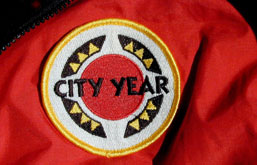
 Jess’ story from City Year Philadelphia.
Jess’ story from City Year Philadelphia.
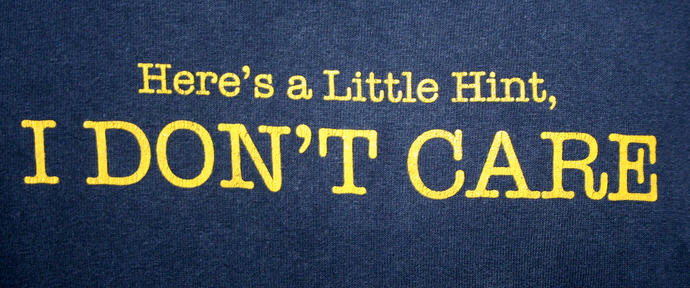




 Nothing but a huge time suck.
Nothing but a huge time suck.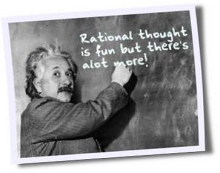 So as I pulled out Tuesday’s USAToday on a flight home from Boston my eyes rested on a feature story on billionaire George Soros and the promotion of his book. Seems that George is hawking something called “reflexivity.” The relevant summary of Soros’ theory of reflexivity from the
So as I pulled out Tuesday’s USAToday on a flight home from Boston my eyes rested on a feature story on billionaire George Soros and the promotion of his book. Seems that George is hawking something called “reflexivity.” The relevant summary of Soros’ theory of reflexivity from the 